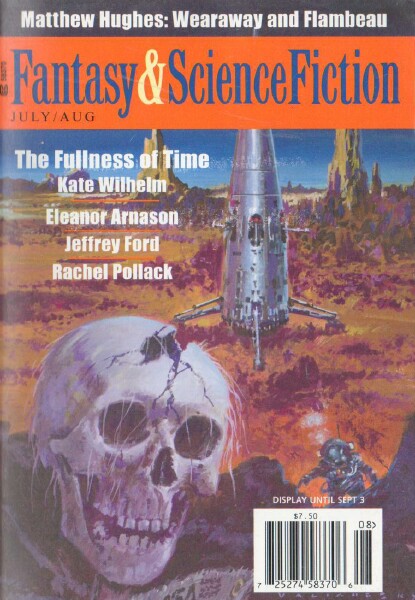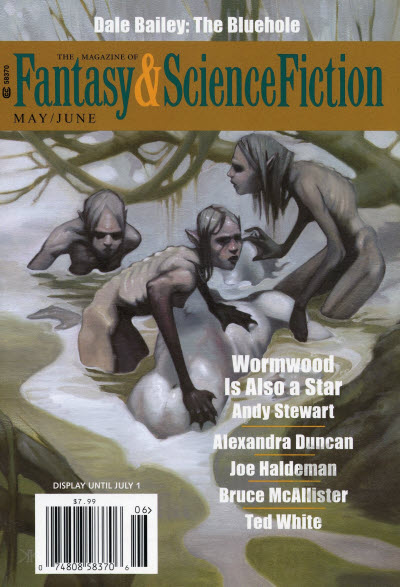The Magazine of Fantasy and Science Fiction May/June 2013
Cover art by Kristen Kest for "Wormwood Is Also a Star," although the connection is tenuous, as I'll mention later.
The usual editorial, book reviews, movie reviews, "Curiosities," and one of their competitions. This one asks the readers to describe a science fiction classic as if it were "chick lit."
The fiction:
"Grizzled Veterans of Many and Much" by Robert Reed. Like the title, I found this story interesting but confusing. It's narrated by the grandson of a business tycoon who is one of the first to have gizmos inserted into his brain that give him super-intelligence, a subjective lifetime of many years, but a very short objective lifetime. The story jumps ahead some years to show a world in which the population is greatly decreased because people who can afford it would rather live many subjective years as a super-genius instead of a normal lifetime. We are shown lots of high tech stuff that results from the enormous acceleration in science. There are also some folks who go back to the soil in a low-tech protest against the treatment. The actual plot of the story involves various family members (the narrator has a brief affair with his young step-grandmother) and a confusing kidnapping-that-isn't-really-a-kidnapping which somehow allows lots of poorer folks to get the brain treatment as well. It held my interest, but this is one of those rare stories that seemed much shorter than it should have been.
"By the Light of the Electronic Moon" by Angelica Gorodischer (translated from the Argentinian author's 1979 collection, I assume from Spanish, by Amalia Gladhart.) A fellow listens to another fellow tell him a story about business deals on a planet ruled by a group of one thousand women, and how he had sex with one while she was hooked up to her sexual virtual reality machine. This story has an unusual mood which I can only call "Science Fiction Realism" in parallel with "Magic Realism." The mundane setting of the narration, not at all futuristic, contrasts with the setting of the story-within-the-story, which is set in a universe where hopping from one strange planet to another on business deals is not at all uncommon.
"Changes" by Rand B. Lee. Set after some kind of reality-bending event changed the world into a mishmosh of different times, places, and dimensions, this story shows a member of a Goddess-worshipping religious group setting out on a rather vague mission, encountering a bunch of telepathic, wildly mutated dogs, and using the undescribed thing that inhabits his body in some way to cut himself and use his blood to work wonders. Did I mention that zones of zero gravity show up? Or that the Goddess herself makes an appearance? This is a story where anything can happen and usually does. More of a mess than anything else.
"The Woman in the Moon" by Albert E. Cowdrey. Comedy about a professor who tells his son-in-law how he plagiarized the work which got him his tenured position from a woman who went to the Moon. Despite the setting a couple of centuries or so in the future, there's no speculative content of any importance; the woman might as well have gone off to some obscure corner of the world. This is the kind of silly comedy where the narrator is named "Threefoot" and there's a city in Alaska called "Nyuknyuk."
"Wormwood Is Also a Star" by Andy Stewart. Takes place in Ukraine in 1992, but in a world where the Chernobyl disaster created a sort of force field around a small area where radiation does not enter, and where six orphan children survived and gained telepathic powers. The story deals with the reporter who broke the story to the world, the teenage telepathic orphan with whom she's having an affair (all the others have committed suicide), the woman's husband, trying to arrange to have Ukraine sell off its nuclear weapons, the woman's father, who opposes such a sale, and the mysterious death of the woman's sister several years ago. (The misleading cover art seems to depict something which is only in the woman's mind. She imagines her sister -- whose dead body was found in a pond -- as a
rusalka, a sort of ghost/river mermaid, which seems to be what is depicted on the cover.) It's a dark story, full of dirty politics and murder. I don't think the present tense narration adds anything.
"Directions for Crossing Troll Bridge" by Alexandra Duncan. One-page thing which is exactly what the title suggests; five numbered hints on how to get past the troll. It may be an allegory for a woman leaving an abusive man.
"The Bluehole" by Dale Bailey. The adult narrator looks back at the death of his best friend in 1982. It's pretty clear right from the start that the kid is going to killed by a monster living in the local lake. In fact, the monster only appears, very briefly, hardly seen at all, right at the end of the story. This is really a tale of nostalgic grief, as the narrator looks back on the friend who he worshiped. (Despite the fact that this story is less violent, less sexual, and contains less profanity than other stories in the issue, it's the only one which carries this warning: "Parents and teachers might want to vet this story before sharing it with younger readers." I can only assume that this is because there is a very, very slight suggestion of homoerotic attraction on the narrator's part. At one point, at a moment of strong emotional bonding between the two boys, he kisses his friend lightly. Is this really a matter for concern in 2013?)
"The Mood Room" by Paul Di Filippo. The narrator relates an anecdote about the invention of a virtual reality gizmo, and how the two people who came up with it went inside it for sex and what happened to them. Kind of a pointless shaggy dog story, littered with all kinds of futuristic jargon.
"Doing Emily" by Joe Haldeman. In a future where professors of English take on the personalities of great writers through a virtual reality gizmo (third one in the issue, I believe), the narrator decides to "do" Emily Dickinson, with unexpected results. A solid, if minor, story from a dependable author.
"Systems of Romance" by Ted White. A musician who is one of the very few rich and famous people who can afford a life-extention treatment has a love affair with a brilliant young woman who uses her math skills to collaborate on music with him. It's really about her resentment of his long life. I give this one an "eh." It may be worthy of note that the author had not been seen in this magazine since 1969.
"Canticle of the Beasts" by Bruce McAllister. Set in the year 1461, this seems to be a single incident in the long, difficult odyssey of three kids -- one a child Pope, one who can look into the future, and one who can detect both good and evil magic through his skin -- as they journey through Italy on a quest to make use of Holy Water at Lake Como to somehow defeat the "Drinkers of Blood" (the word "vampire" is never used) who have plagued the world since the birth of Christ. This particular tale shows how supernatural aid saves them from the monsters, as well as the very human soldiers who are after the Pope for political reasons. A very Catholic story.




